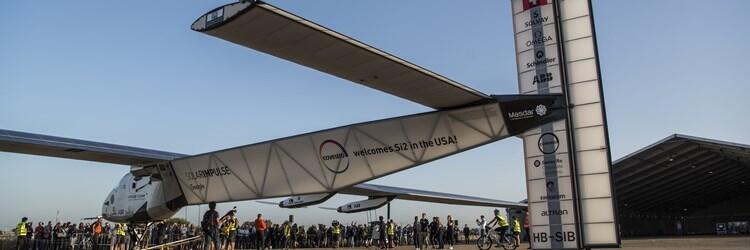The two Swiss pioneers, Bertrand Piccard and André Borschberg, will shortly be aiming to complete the first around-the-world flight in their exclusively solar-powered aircraft.
According to Covestro, the aircraft has landed safely in Sevilla, Spain, after a 70-hour transatlantic flight. The groundbreaking Solar Impulse project will end in Abu Dhabi, where it began over a year ago.
However, this isn’t the end of the success story for official partner Covestro. It says that its innovative and sustainable materials, which enabled the mission with the ultra lightweight aircraft, will find their way into countless everyday products in the future.
“Solar Impulse is a powerful demonstration of the role that innovative materials play in fulfilling people’s visions,” said Covestro CEO Patrick Thomas. “Solar Impulse has also served as a flying laboratory, providing us with valuable information. We’ve then used this information for innovations to make the world a brighter place.”
The key challenge in designing Solar Impulse was to develop particularly lightweight materials to compensate for the heavy weight of the batteries. These store the electricity generated by the solar cells and must have sufficient capacity to enable the aircraft to also fly at night.
For example. Covestro explains that the cockpit door has a polyurethane foam with a very low density of less than 40 kg/m3 which keeps the weight extremely low. The Covestro researchers achieved this by reducing the pores to micrometer scale, with 96 percent of the foam consisting of gaseous blowing agent and only four percent solid polyurethane. For comparison: water has a density of 1,000 kg/m3which is 25 times higher than the specific weight of the foam.
The foam also offers very good insulation. A grade with larger pores is already used in almost all the world’s refrigerators to stop food from spoiling. Covestro has continued to develop the products, thereby enabling manufacturers to increase the already high efficiency of their appliances even further.
Covestro explains that carbon fibre-reinforced polyurethane composites also offer opportunities for reducing weight and thus cutting energy consumption. In addition, the robust materials provide the door of the Solar Impulse with the necessary mechanical strength.
Covestro has recognised the potential of these products and now offers them for the manufacture of structural automotive components. The parts can be manufactured efficiently using high-pressure resin transfer moulding (HP-RTM).
Polycarbonate from Covestro also combines low weight and impressive strength. It claims that its excellent transparency made it the material of choice for the cockpit glazing. Here, too, extremely thin polycarbonate sheets create an exceptionally lightweight solution that benefits from the extensive expertise of Covestro specialists in processing Makrolon panels using thermoforming.
It says that the panels can be given special properties depending on the specific requirements. For example, a special coating can prevent the glazing from fogging over. Polycarbonate sheets are highly versatile and can be used in areas ranging from roofs in sports stadiums and facade designs for buildings to noise barriers along highways and rail lines.
Flexible polyurethane foam has long been synonymous with comfortable upholstered furniture and mattresses. Yet even its low weight wasn’t low enough for the designers of the Solar Impulse aircraft. A high-tech solution based on thermoplastic polyurethane (TPU) films inflated with air was used in the aircraft seat. The key here is that the pilot can adjust the seat to suit his individual needs by inflating it or releasing air from it. The seat structure is also extremely lightweight, with the result that the solution is already being used in many other aircraft.
Source: NetComposites











